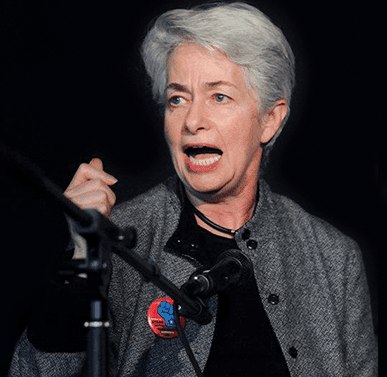Dem Women: From Resistance to Organizing
By • September 21, 2017 0 661

Heather Booth was introduced as “the most influential person you never heard of” at the Woman’s National Democratic Club on Tuesday, Sept. 19. That night, WNDC premiered the newest film by filmmaker Lilly Rivlin, “Heather Booth: Changing the World,” to a crowd of progressive Democratic women packed into the almost 100-year-old ballroom of the club’s headquarters, a former Dupont Circle mansion.
The film documents Booth’s nearly 60 years of social activism, including community organizing with civil and women’s rights icons from Julian Bond to Elizabeth Warren. She became a civil rights activist as a teenager in the 1950s with Fannie Lou Hamer and the Freedom Summer Project after returning from a life-changing summer in the still-new nation of Israel.
Booth went on to organize anti-Vietnam war demonstrations as a student at the University of Chicago in the 1960s. Seeming to be at the forefront of every major issue of the time, she founded the Jane Underground, a group advocating for early childcare for working mothers, equal educational opportunity for all, women’s rights for safe abortions, Title IX and equal pay.
Through all the differing issue in the 1970s and ’80s, however, she discovered her passion and talent for organizing community organizers. In 1973, Booth launched the Midwest Academy, first in Chicago and now throughout the United States. The academy has trained more than 25,000 grass-roots activists involved in almost every progressive issue on the spectrum.
After the film, the tall, slim, highly animated Booth, 72, herself leapt onto the stage. With a voice and manner full of enthusiasm, she presented a way out of the post-election morass that most all Democratic activists have found themselves in since November 2016, when Donald Trump defeated Hillary Clinton for the presidency. Probably every woman in the WNDC clubhouse that night had believed that Clinton’s destiny was to become the first woman president.
But Booth didn’t dwell on the election, or even mention Donald Trump. “Resistance is great!” she said, in a pattern that always started with the positive. “How many of you have participated in marches?” she asked, grinning when almost every hand in the room went up. Pulling a pink knit pussyhat from her bag, she laughed. “Sometimes I need to wear this too,” she said, as many of the women cheered.
“But resistance is just a start!” Booth exclaimed. “It’s not enough. We need to do organizing, to talk to people, everyone, wherever they are, who are no longer sure about the future of the progressive issues.
“There may be people who share our values but don’t agree with us about some of our policies,” Booth continued. “There are people in fly-over country who feel left behind, facing a diminished life, don’t know what to do and have lost hope. We need to talk to them, listen and talk to them. We need to listen to them, talk to them, provide help with what they need — even if it’s to obtain an ID card.
“We’ve lost over 1,000 public offices in the past 10 years and the Democratic Party has a big hill to climb over the next few years to get them back. We have to build a broad party structure. We can’t use just one tactic. We have to employ our people in a variety of ways. It’s social media and marches and going door to door, talking to people who share our values regularly, not just one shot.”
Her organizing principles are summed up in her Moving Forward agenda: “Engage and talk with people about their interests and concerns. Tell stories of real people impacted. Build ongoing organization to give people a sense of their power with improvements in people’s lives. And change the balance of power.”
To that end, a fund has been created to grant $10,000 a month to state Democratic organizations that develop plans to tap party members to do community organizing.
That is Booth’s strength. Several of the women in the audience had been to one of Booth’s Academy sessions. “Everyone who works with her loves her,” several testified, calling her the most completely organized person they knew.
Her biggest advocate has been her husband, to whom she has been married for 40 years, raising two sons. Paul Booth recently retired as executive assistant to the president of the American Federation of State, County and Municipal Employees, the nation’s largest union of government employees. He was the one with the steady federal job that brought them to Washington, according to Heather Booth. But she found the capitol’s political scene too national, returning again and again to her roots in Chicago to work on the community level. Her husband often joins in, however. “I have been trained for 40 years,” he said, laughing.

